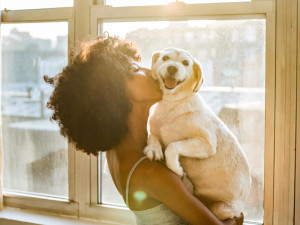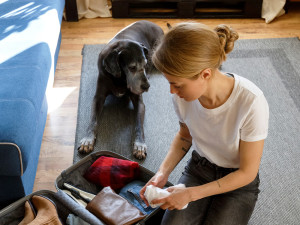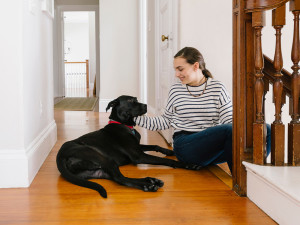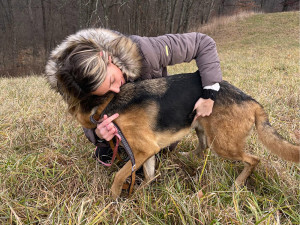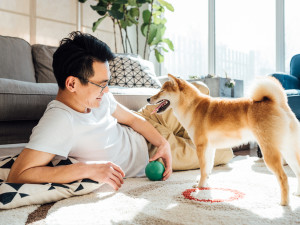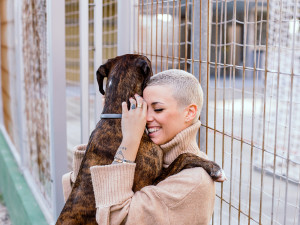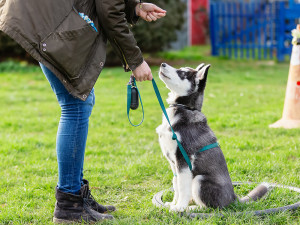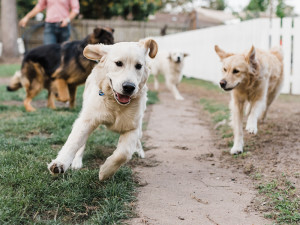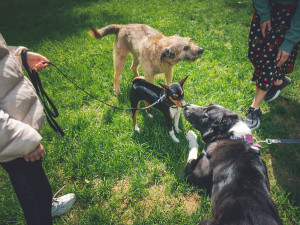How to Choose a Trustworthy Dog Sitter
Leave your pup in the best possible hands with these tips.
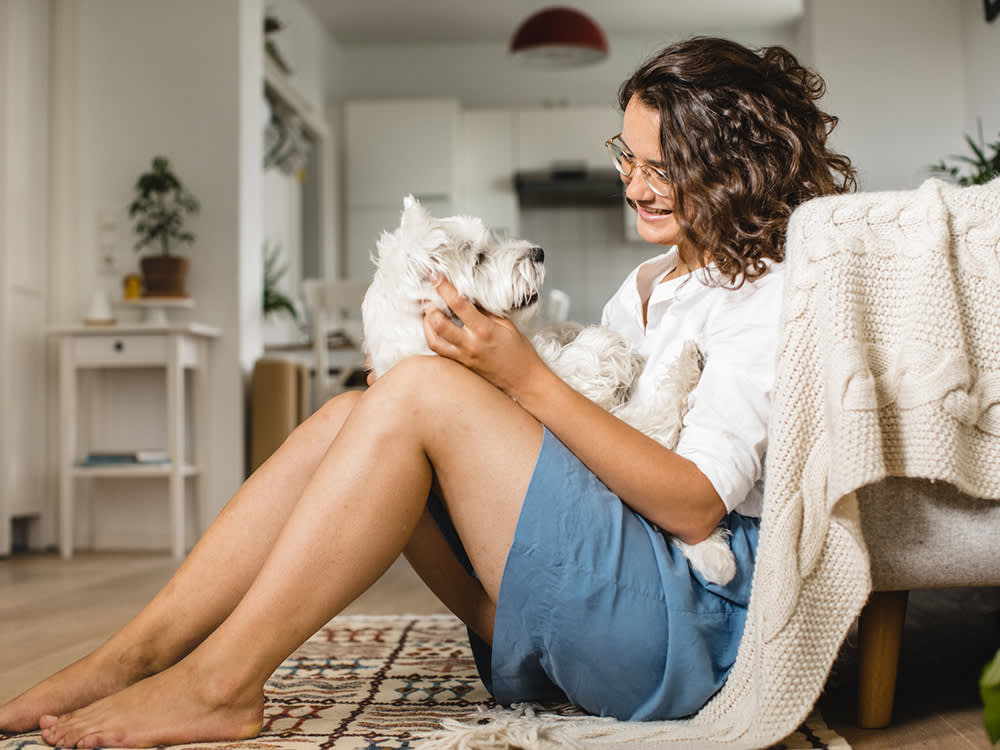
Share Article
Anyone who has a dog, especially one with special needs — such as separation anxiety — will understand the challenge of finding a sitter you and your pup trust and adore. Your dog deserves nothing less, right? When you don’t want to subject your pup to the stress and unfamiliarity of a boarding kennel or have a friend who will just drop by at feeding time, a pet sitter is a must-have. But the question is: How can you be sure that the dog sitter you’ve hired is reliable? Below, we help demystify the process.
Finding Trusted Dog Sitters
Anyone can call themself a dog sitter. Create a snappy website, choose a catchy title, print smart-looking business cards, ask friends to provide references, and voilà! Instant pet sitter. Heck, under those conditions, even Beelzebub could launch a successful service. They could even show an official-looking membership letter from organizations like Pet Sitters Associates, LLC. But let’s be clear: Pet Sitters Associates simply provides insurance. They do not license or certify pet sitters, nor do they monitor members or provide any type of training.
Another voluntary non-profit, National Association of Professional Pet Sitters (NAPPS), offers tools and support to their members’ businesses. However, like Pet Sitters Associates, NAPPS does not monitor or evaluate its members. The NAPPS website notes that certification does not guarantee quality service, only that the member has “met certain objective criteria through a course of study and/or testing as a professional pet sitter.”
So, how do you find this trustworthy soul? You’ll need to make sure the person you choose is trained and professional. It makes sense to start with a referral from someone you know and respect — a friend or veterinarian, for instance — preferably someone who has personally used the individual’s services. Then conduct a thorough interview and review of their services.

Questions You Should Ask a Pet Sitter During an Interview
Hiring a pet sitter is a serious process. So, your best bet is to conduct a thorough interview to ensure the sitter is compatible and keep an eye out for any red flags. During your initial meeting with a potential pet sitter, you should be prepared to get answers to a list of questions, including:
Will you provide a written service contract spelling out fees and specific services (such as exercise, grooming, and playtime)?
If you provide live-in services, can you specify the amount of time you will actually spend with my pet? Is this detailed in the contract?
Will you provide written proof of commercial liability insurance (to cover accidents and negligence)? Are you bonded (to protect against theft)? What training have you received?
Do you take notes about my dog’s particular issues and needs (their fears, medical conditions, medications, and routines)?
What if an emergency prevents you from fulfilling your duties? Do you have a backup?
Will you provide phone numbers of other clients who have agreed to serve as references?
Questions the Pet Sitter Should Ask You
You shouldn’t be the only one asking questions; the sitter should be asking questions, too. “I [use] a two-page questionnaire to make sure I have all the information I need,” says Tracy Timmer, a professional pet sitter and chairperson of East Bay Pet Sitter’s Association (EBPSA) in Oakland, California.
“Clients can avoid problems by paying attention while we’re going through the checklist,” Timmer continues. “There are so many things that can arise while they’re gone that they just don’t think about.” Among them are unexpected visits from repair people and housekeepers, medical emergencies, and household accidents. Even small oversights can add up to a frustrating pet-sitting experience. “Like leaving enough food for their pet or providing the code or phone number for their alarm service,” Timmer offers. “People don’t think to leave things where I can find them, like paper towels and cleaning supplies. Clients need to think ahead to determine what the sitter might need.”
A little due diligence before hiring a pet sitter can pay future dividends. You don’t want someone who will drop in just long enough to refill Rocket’s water bowl. The ideal sitter will spend quality time with your dog, provide the amount of exercise you have requested, and be sufficiently familiar with animals to know when veterinary care is needed. A sitter may also handle minor household duties, such as watering plants and collecting mail if arranged in advance.
Hiring a dog sitter is a serious process. Remember: They will not only be responsible for your pet but also will have regular access to your home. All the more reason to take steps to ensure that you’re not rolling out the welcome mat for Lizzie Borden or Ted Bundy.
A Few Tips for Hiring a Pet Sitter
1. Ask for each sitter’s references — and call them.
Slick websites and display ads in phone directories can be deceiving. The only way you can gauge a sitter is through past performance. Not only will you cull the bad seeds, but talking to happy clients will increase your confidence when you’re away from home.
2. Get a move on.
Land the sitter of your dreams by booking early, especially if you’re hiring someone for the first time or are new to the area.
3. Interview several sitters.
You’ll need to weed through many sitters to find the best fit for your needs. Ask your veterinarian, dog trainer, agility coach, friends at the dog park, and even the pros at your pet supply shop for recommendations. NAPSS also provides a nationwide dog sitter referral networkopens in new tab searchable by zip code.
4. Be clear about your expectations.
Each person and their pet are different, so don’t be afraid to say what you want. Whether that’s asking the sitter to be around for a certain number of hours a day or if you expect your dog to be walked for two hours, brushed every morning, read a bedtime story to…whatever. It’s your dime.
5. Meet up for a walk with your dog.
Is your perspective sitter interacting well with your dog? Does your dog seem to be enjoying their time with the sitter? Does the sitter seem natural with dogs, curious, and generally interested in your dog? This is also a good time to talk over your dog’s special needs or challenges.
6. Tour your house together.
Remember, these pros will be coming into your home. Let them know what’s off limits and what you expect in terms of the house responsibilities, such as collecting mail, putting out the garbage, shoveling snow, etc.; and emergency procedures, such as turning off the water and gas or disarming the burglar alarm. Make note of any routine service calls (housekeeper, gardener, repair person); potential visitors (for example, does your brother have a key to your house and tend to drop in without calling first?); and the location of cleaning supplies and your dog’s medications.
7. Leave clear instructions for the house and animals.
Write down instructions about feeding, such as how much and how often, medication, your vet’s contact information, the closest 24-hour ER vet, and backup assistance. (Be sure your backups know they will be on call.) Have enough of your pet’s food on hand to last through your anticipated absence — if in doubt, buy extra (and tell the sitter where to find it).
8. Get proof of insurance.
Request proof of bonding or liability insurance coverage. This is also a good indicator of how professional your sitter really is.
9. Establish all the fees in advance.
Another advantage of interviewing several sitters is that it provides a good sense of the going rate in your area for pet sitting.
10. Stay in touch.
Ask if your sitter has any routines for providing status reports via email, text, or online. Determine how often they provide reports and if that level of information is sufficient.
11. Should you tip a sitter?
Tipping your dog sitter is optional, but if you had a good experience with them, it’s a nice way to show appreciation for providing quality care for your pet.
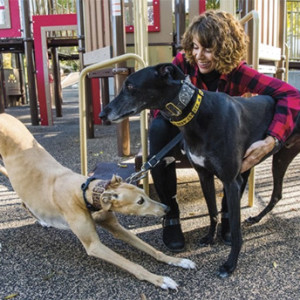
Eileen Mitchell
Eileen Mitchell, a freelance writer who blogs about people and pets, volunteers with Greyhound rescue groups in the San Francisco Bay Area.
Related articles
![A woman with tattoos with close shaved blonde hair wearing a tan sweater hugging her merle coat dog outside of a dog shelter]()
Lost Pets: How to Get Them Back
Find out what to do when your pet goes missing with these tips from a pet recovery expert.
![dog leaning on laptop while man types]()
7 Important Papers You Should Always Keep on File For Your Pet
It will be super helpful if you ever need a pet-sitter, too.
![Woman trains with a young husky on a dog training field]()
How to Find a Qualified Trainer for Your New Dog
The questions to ask and credentials to look out for to find the right trainer for your dog, according to a pro.
![Four dogs running around in an enclosed outside area]()
Should You Send Your Pup to Dog Daycare?
Doggy daycare is more than just fun and games.
![Three dogs on leashes meeting and sniffing each other on a walk on the summer grass with owners]()
How Do I Get My Shy Dog To Socialize?
Kinship Collective dog trainer Robert Haussmann’s tips for getting a shy pup to go from wallflower to social butterfly.

